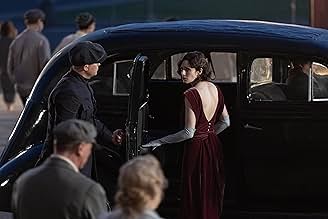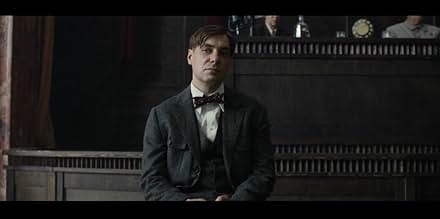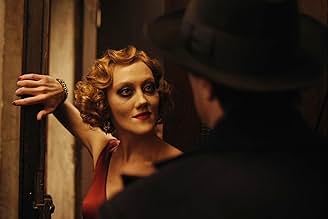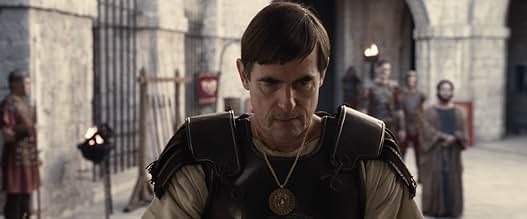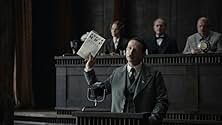Master i Margarita
- 2024
- 2 घं 36 मि
अपनी भाषा में प्लॉट जोड़ेंA writer's novel is banned and play canceled. He then conceives a satirical novel where a devil-like character metaphorically revenges those responsible. Knowing it cannot be published, his ... सभी पढ़ेंA writer's novel is banned and play canceled. He then conceives a satirical novel where a devil-like character metaphorically revenges those responsible. Knowing it cannot be published, his muse Margarita pushes him to write it anyway.A writer's novel is banned and play canceled. He then conceives a satirical novel where a devil-like character metaphorically revenges those responsible. Knowing it cannot be published, his muse Margarita pushes him to write it anyway.
- निर्देशक
- लेखक
- स्टार
- पुरस्कार
- 14 जीत और कुल 9 नामांकन
Aleksei Guskov
- Maygel
- (as Aleksey Guskov)
Danil Steklov
- Ivan Bezdomnyy
- (as Daniil Steklov)
फ़ीचर्ड समीक्षाएं
The book. The film. The book. The film. A continuous confrontation with no winners. In my book (pun intended), with The Master and Margarita by Bulgakov you can't do the film without the book. And this is my major premise in this review. Had I not reacquainted myself with the book prior to the film, I wouldn't have gained either the gist of the latter or the dark satirical wisdom of the novel yet again. Instead, I had done my homework: immersed myself in the book, watched professors of literature on Bulgakov's hidden motives, vicariously walked along Moscow streets with the help of a youtube tour.
One of the crucial things I quarried on this expedition is that Bulgakov spent 12 years writing the masterpiece (between 1928 and 1940). No wonder, this resulted in incredible density of the text: 2-dimension narrative, vividly drawn characters, spellbinding dialogues and descriptions. Every plotline comes packed with loads of profound subtexts. And again, I could only appreciate all this only after my versatile reasearch. Let's take Frida's appearance for example. Seemingly passing, this character alludes to the idea of MERCY and the way Margarita gracefully personifies MERCY. She raises to the challenge of freeing Frida from eternal punishment. This clemency is mirrored by Pilat's reluctance from eternal punishment to extend MERCY to Yeshua (Jesus of Nazareth) in Jerusalem setting of the novel.
Methinks, MERCY is the crux of the novel. Methinks, it never shone through in the film though. Having embraced all the landmark events, the director chose to rearrange them in another order under the over-arching story of Master and Margarita's romance. I have to say it for the director, the reshuffled episodes are given in a surprisingly cohesive order. And yet, you can't have it all. If you focus on the love line, you cannot thoroughly cover Professor Woland (the devil) and his retinue's visit to Moscow. The way they challenge moscovites' religious convictions and condemn the behaviour of Massolit's corrupt social climbers and profiteers, Behemoth's whims and Koroviev's vagaries also have to go. Interestingly though, the creators took the risk of adding one more dimension - the author's life, which allegedly parallels Michhail Bulgakov's misfortunes and hardships against the backdrop of heavy criticism for his works and plays.
So, in the production the main character Master is somewhat expanded: not only does he personify the book character, but he also sheds some light on Bulgakov's love-hate relationship with the Soviet authorities. Both personalities were successfully performed by Eugeny Tsyganov. He was really convincing in his role of a distressed and desperate genius. His devoted lover Margarita by Julia Snigir left me cold. Guilty as charged, I couldn't help comparing this cinematic milk-and-water Margarita to that I envisaged when reading. My Margarita came across as a volatile and vibrant woman, let alone her witch's acquired personality. Having turned into a witch, Bulgakov's Margarita completely transformed, became restless, reckless even. Passion unleashed. None of this was played out by Julia. Unluckily, she could not hold her own with August Diehl - Woland (Devil in disguise). The latter, though, is a vital example of how successful directors' decisions can be cast wise. Orchestrating his character, August Diehl demonstrated an ample scope: from playful remarks to devilishly frightening preaches. Hats off!
Another movie character which made an indelible impression on me is Moscow. The city enveils each and every scene. The 3-dimension plot is set in utopian Moscow. Moscow which was in actual fact designed by Stalin's people. Moscow which never happened. These oppressive behemoth buildings hover over the humdrum of Moscow daily life, keep an eye on the citizens, remind them of the ruler. This formidable city could've been drawn with better graphics, but even so the mystique of the narrative rubbed off on me.
Needless to say, this multifarious creation has been getting a relentless onslaught of criticism. The critics' major contention is that this production is nothing more than just another slick "Hollywood-esque" knock off: the romance, the city, the blasts. Without wishing to encroach on culture-vultures' territory, I agree to disagree with this degrading look. Nor do I buy this "the film is based very loosely on the book" stance. Why should it be? We are looking at two different art forms here. Whereas literature is about setting off a reader's reflective judgments and imagining through language, cinematic art abounds in all sorts of technical and creative components: lighting, camera angles, sound design, editing, and acting. All these make a film a coherent and powerful visual tale. And from where I am standing, The Master and Margarita's cinematic adaptation panned out as powerful.
It's been two weeks since I finished reading and went to the cinema. The fact that I keep thinking about both the film and the book is quite telling. Seldom do I indulge in that profound research on cinematic forms. Apparently, both worked for me and triggered the whole gamut of emotions. In my mind palace these two are merging into each other, accomplishing each other. And this is a very complex and ingenious picture. I wouldn't have fathomed the film without a prior reading. Nor would my emotions would be that strong without the rendition. The manifold idea behind both of them makes plain "I liked", "I didn't like" review nigh on impossible. My recommendation is to do both and to make the cogs in your brain turn. Buckle down and enjoy the trip.
One of the crucial things I quarried on this expedition is that Bulgakov spent 12 years writing the masterpiece (between 1928 and 1940). No wonder, this resulted in incredible density of the text: 2-dimension narrative, vividly drawn characters, spellbinding dialogues and descriptions. Every plotline comes packed with loads of profound subtexts. And again, I could only appreciate all this only after my versatile reasearch. Let's take Frida's appearance for example. Seemingly passing, this character alludes to the idea of MERCY and the way Margarita gracefully personifies MERCY. She raises to the challenge of freeing Frida from eternal punishment. This clemency is mirrored by Pilat's reluctance from eternal punishment to extend MERCY to Yeshua (Jesus of Nazareth) in Jerusalem setting of the novel.
Methinks, MERCY is the crux of the novel. Methinks, it never shone through in the film though. Having embraced all the landmark events, the director chose to rearrange them in another order under the over-arching story of Master and Margarita's romance. I have to say it for the director, the reshuffled episodes are given in a surprisingly cohesive order. And yet, you can't have it all. If you focus on the love line, you cannot thoroughly cover Professor Woland (the devil) and his retinue's visit to Moscow. The way they challenge moscovites' religious convictions and condemn the behaviour of Massolit's corrupt social climbers and profiteers, Behemoth's whims and Koroviev's vagaries also have to go. Interestingly though, the creators took the risk of adding one more dimension - the author's life, which allegedly parallels Michhail Bulgakov's misfortunes and hardships against the backdrop of heavy criticism for his works and plays.
So, in the production the main character Master is somewhat expanded: not only does he personify the book character, but he also sheds some light on Bulgakov's love-hate relationship with the Soviet authorities. Both personalities were successfully performed by Eugeny Tsyganov. He was really convincing in his role of a distressed and desperate genius. His devoted lover Margarita by Julia Snigir left me cold. Guilty as charged, I couldn't help comparing this cinematic milk-and-water Margarita to that I envisaged when reading. My Margarita came across as a volatile and vibrant woman, let alone her witch's acquired personality. Having turned into a witch, Bulgakov's Margarita completely transformed, became restless, reckless even. Passion unleashed. None of this was played out by Julia. Unluckily, she could not hold her own with August Diehl - Woland (Devil in disguise). The latter, though, is a vital example of how successful directors' decisions can be cast wise. Orchestrating his character, August Diehl demonstrated an ample scope: from playful remarks to devilishly frightening preaches. Hats off!
Another movie character which made an indelible impression on me is Moscow. The city enveils each and every scene. The 3-dimension plot is set in utopian Moscow. Moscow which was in actual fact designed by Stalin's people. Moscow which never happened. These oppressive behemoth buildings hover over the humdrum of Moscow daily life, keep an eye on the citizens, remind them of the ruler. This formidable city could've been drawn with better graphics, but even so the mystique of the narrative rubbed off on me.
Needless to say, this multifarious creation has been getting a relentless onslaught of criticism. The critics' major contention is that this production is nothing more than just another slick "Hollywood-esque" knock off: the romance, the city, the blasts. Without wishing to encroach on culture-vultures' territory, I agree to disagree with this degrading look. Nor do I buy this "the film is based very loosely on the book" stance. Why should it be? We are looking at two different art forms here. Whereas literature is about setting off a reader's reflective judgments and imagining through language, cinematic art abounds in all sorts of technical and creative components: lighting, camera angles, sound design, editing, and acting. All these make a film a coherent and powerful visual tale. And from where I am standing, The Master and Margarita's cinematic adaptation panned out as powerful.
It's been two weeks since I finished reading and went to the cinema. The fact that I keep thinking about both the film and the book is quite telling. Seldom do I indulge in that profound research on cinematic forms. Apparently, both worked for me and triggered the whole gamut of emotions. In my mind palace these two are merging into each other, accomplishing each other. And this is a very complex and ingenious picture. I wouldn't have fathomed the film without a prior reading. Nor would my emotions would be that strong without the rendition. The manifold idea behind both of them makes plain "I liked", "I didn't like" review nigh on impossible. My recommendation is to do both and to make the cogs in your brain turn. Buckle down and enjoy the trip.
Great movie!
At times, quotes from the novel are spoken word for word, at times the director changes details, but clearly just to fit everything in - the runtime is already huge.
Voland and the Master are miscast, especially the Master. They confused a melancholic alcoholic with a gothic metrosexual. The cat remains undeveloped. How the actor who played Ivanushka ended up in this movie is a mystery.
But Gella, Margarita, Koroviev, Pilate, and Maigret are good choices.
Stravinsky is very good!
Stepa Likhodeev is brilliantly played, the best role (it's a pity it's not bigger).
All the most important quotes from the book are spoken, but there wasn't enough time for the funniest ones.
The director, praise Satan, didn't fill the movie with funny scenes, although there are plenty in the book, and instead focused on exactly what Bulgakov's novel is about: censorship under a dictator, which drives not only writers but also ordinary citizens insane.
At times, quotes from the novel are spoken word for word, at times the director changes details, but clearly just to fit everything in - the runtime is already huge.
Voland and the Master are miscast, especially the Master. They confused a melancholic alcoholic with a gothic metrosexual. The cat remains undeveloped. How the actor who played Ivanushka ended up in this movie is a mystery.
But Gella, Margarita, Koroviev, Pilate, and Maigret are good choices.
Stravinsky is very good!
Stepa Likhodeev is brilliantly played, the best role (it's a pity it's not bigger).
All the most important quotes from the book are spoken, but there wasn't enough time for the funniest ones.
The director, praise Satan, didn't fill the movie with funny scenes, although there are plenty in the book, and instead focused on exactly what Bulgakov's novel is about: censorship under a dictator, which drives not only writers but also ordinary citizens insane.
It's a great film inspired by Bulgakov masterpiece. It's better than any "anti utopian" film.
1) great actors - the fact of such a mix of actors makes it a great play, truly enjoyable by sophisticated characters 2) interesting plot twist (it's not 100% adaptation of book) - makes an interesting viewpoint of the book and in fact I liked it a lot 3) no annoying music - these days most films have this annoying background music to add whatever emotions. Here no music is needed as you are totally into the play and story 4) great visuals - how they designed Moscow and USSR is great 5) absolute must to watch simply due to the fact we are living in a repeated history, what's happening in Russia is pretty much what the book is talking about 6) one of the best films I've watched so far, like fresh air after all identical American movies-blockbusters.
1) great actors - the fact of such a mix of actors makes it a great play, truly enjoyable by sophisticated characters 2) interesting plot twist (it's not 100% adaptation of book) - makes an interesting viewpoint of the book and in fact I liked it a lot 3) no annoying music - these days most films have this annoying background music to add whatever emotions. Here no music is needed as you are totally into the play and story 4) great visuals - how they designed Moscow and USSR is great 5) absolute must to watch simply due to the fact we are living in a repeated history, what's happening in Russia is pretty much what the book is talking about 6) one of the best films I've watched so far, like fresh air after all identical American movies-blockbusters.
The movie is done really well. It looks great, it's well edited, has great sound design and all the performances are flawless.
The timelines and realities are so convoluted that it would make Nolan scratch his head. However, the movie does a great job at keeping the story comprehensible and engaging.
I usually don't like long movies, but in this case the two and a half hours runtime is well justified and passed by quickly. There's no runtime padding and everything feels essential.
The only reason I subtracted one star is that the humor from the book didn't properly precipitate into this movie (but that's super subjective so take with a grain of salt). Otherwise it's a nearly perfect and innovative adaptation of a good book.
The timelines and realities are so convoluted that it would make Nolan scratch his head. However, the movie does a great job at keeping the story comprehensible and engaging.
I usually don't like long movies, but in this case the two and a half hours runtime is well justified and passed by quickly. There's no runtime padding and everything feels essential.
The only reason I subtracted one star is that the humor from the book didn't properly precipitate into this movie (but that's super subjective so take with a grain of salt). Otherwise it's a nearly perfect and innovative adaptation of a good book.
Its quite an impressive result - to squeeze such a book into single movie.
If previous series were dedicated a lot for Jesus (Ganozzi) and Pontius Pilat theme, here we see quite an extensive story of Master.
I really liked that Master is shown not as crazy obsessed by his novel psycho individual, but rather as a normal person who was just killed step by step with his own genius by new Soviet ideology and traitors/slaves of this new era propaganda
You can easily build a parallel with what is happening today in Russia.
I really liked the episode in the end when city is on fire with all the stars symbols on the roof and the most famous sentence and Pontius and how he hates the city which is swallowed by the darkness
That was the epic end!
If previous series were dedicated a lot for Jesus (Ganozzi) and Pontius Pilat theme, here we see quite an extensive story of Master.
I really liked that Master is shown not as crazy obsessed by his novel psycho individual, but rather as a normal person who was just killed step by step with his own genius by new Soviet ideology and traitors/slaves of this new era propaganda
You can easily build a parallel with what is happening today in Russia.
I really liked the episode in the end when city is on fire with all the stars symbols on the roof and the most famous sentence and Pontius and how he hates the city which is swallowed by the darkness
That was the epic end!
क्या आपको पता है
- कनेक्शनReferenced in Close-Up: The Master and Margarita (2024)
टॉप पसंद
रेटिंग देने के लिए साइन-इन करें और वैयक्तिकृत सुझावों के लिए वॉचलिस्ट करें
- How long is The Master and Margarita?Alexa द्वारा संचालित
विवरण
- रिलीज़ की तारीख़
- कंट्री ऑफ़ ओरिजिन
- आधिकारिक साइट
- भाषाएं
- इस रूप में भी जाना जाता है
- The Master and Margarita
- फ़िल्माने की जगहें
- उत्पादन कंपनियां
- IMDbPro पर और कंपनी क्रेडिट देखें
बॉक्स ऑफ़िस
- बजट
- RUR 1,23,30,00,000(अनुमानित)
- दुनिया भर में सकल
- $2,91,26,671
- चलने की अवधि2 घंटे 36 मिनट
- रंग
- पक्ष अनुपात
- 2.39:1
इस पेज में योगदान दें
किसी बदलाव का सुझाव दें या अनुपलब्ध कॉन्टेंट जोड़ें

![Trailer [OV] देखें](https://m.media-amazon.com/images/M/MV5BZTk1ODEzN2MtYzRiZS00NTBlLWIxYmMtM2E4MzYxYTU4YWU0XkEyXkFqcGdeQXRyYW5zY29kZS13b3JrZmxvdw@@._V1_QL75_UX500_CR0)
